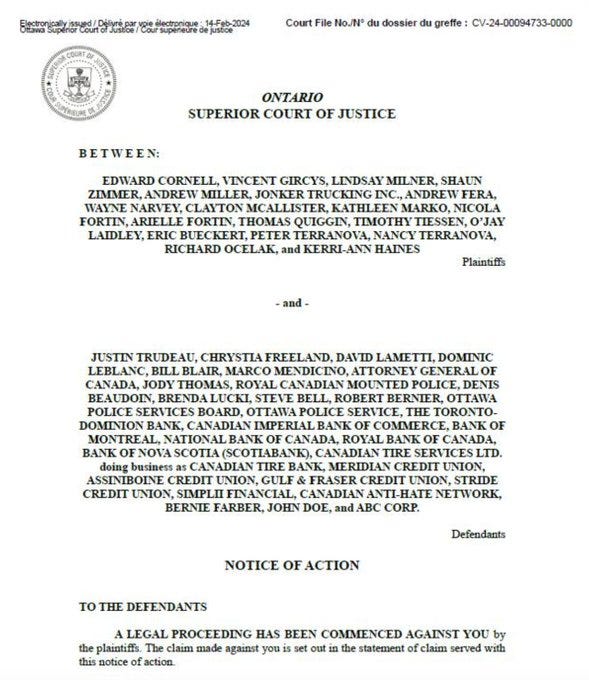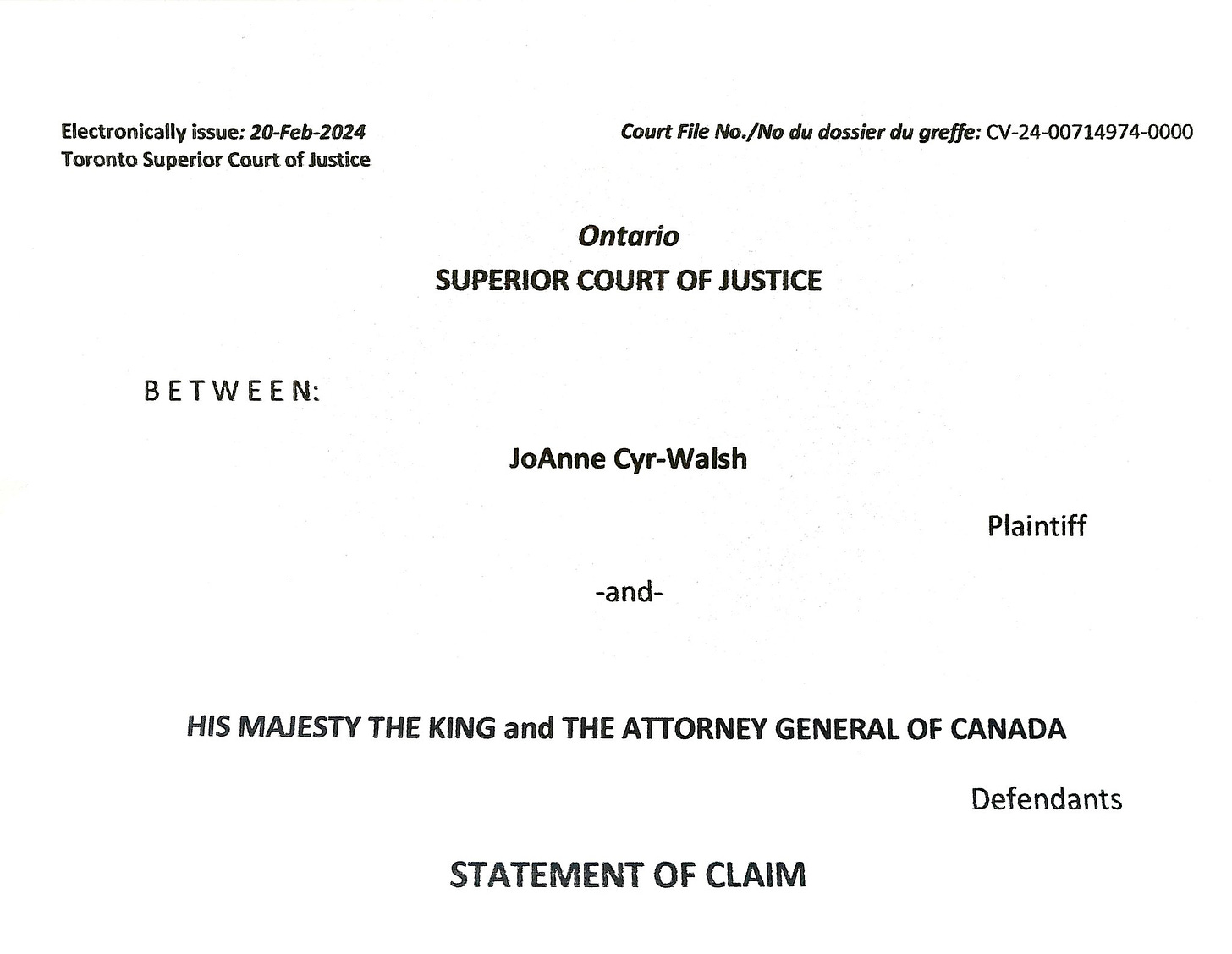Dozens of Ottawa protestors file several lawsuits seeking tens of millions of dollars from the government, RCMP, banks, and others over the Emergency Act invocation that was ruled unconstitutional
Over the last week, dozens of individuals who were arrested and had their bank accounts frozen have filed multiple lawsuits seeking tens of millions of dollars in damages.
The lawsuits include Canadian Prime Minister Justin Trudeau, Deputy Canadian Prime Minister and Minister of Finance Chrystia Freeland, the Attorney General of Canada, RCMP, banks, and many others, over the invocation of the Emergencies Act—a move that has recently been declared unconstitutional by Federal Court Judge Justice Mosley.
Edward Cornell, a retired Canadian soldier, and Vincent Gircys, a retired OPP officer along with 18 others, have filed a lawsuit in Ontario Superior Court against Justin Trudeau, Chrystia Freeland, the RCMP, banks, and several others, seeking $2 million in damages each.
Edward Cornell and Vincent Gircys are the two men who became the main applicants in the case against the Canadian government that Justice Mosley ruled in favor of, finding the government's actions unconstitutional over the invocation of the Emergencies Act and the freezing of bank accounts.
Clayton McAllister, who is one of the 20 applicants in the lawsuit, spoke with The Canadian Independent and said he was one of the first protestors to be arrested after the Emergencies Act was declared. He said he lied down on his back in the snow in front of a swarm of officers before he was arrested.
Clayton says he was "arrested, then taken into a paddy wagon and left in it for 8 hours, then driven out of town and dropped off at a gas station with my cellphone only at one percent." He also says "Police took my keys to my truck, which was parked downtown Ottawa, so I had no way to get my truck. Then two days later, I watched them on TV smash the windows to my truck, and after that, all my bank accounts were frozen."
Tamara Lich and her husband, Dwayne Lich, have together filed a lawsuit in Alberta’s Court of King's Bench against His Majesty the King and the Attorney General of Canada, seeking $2 million in damages over the freezing of their bank accounts.
Daniel Bulford, a former Royal Canadian Mounted Police intelligence officer and sniper who was part of Prime Minister Justin Trudeau’s security team, has also filed a statement of claim in Alberta’s Court of Queen's Bench against His Majesty the King and the Attorney General of Canada, seeking $2 million in damages over the freezing of his bank accounts.
Thomas James Marazzo, a former military officer in the Canadian Armed Forces, who had his bank account frozen, has launched an individual lawsuit against His Majesty the King and the Attorney General of Canada, seeking nearly $2.4 million.
Joanne Cyr Walsh, a senior citizen, has filed a $1.1 million lawsuit in Toronto's Ontario Superior Court against His Majesty the King and the Attorney General of Canada.
The Canadian Independent spoke with Joanne and she said, “I am a senior. I was arrested and publicly humiliated. My arrest was captured live on CBC, and it's costing tons of money in legal fees and traveling costs. It is time-consuming and prevents me from earning income as an artist.” She says her bank account was not frozen.
Just over two years ago, on January 29, 2022, the Freedom Convoy truckers and protestors descended on the nation's capital in Ottawa to protest COVID-19 mandates and restrictions. Truckers rolled in with horns blaring, guided by police, to park their vehicles out front of the Parliament building and throughout various downtown Ottawa streets. The city of Ottawa became a hot spot for weeks, bringing together thousands of Canadians in frigid temperatures who were sick and tired of the government's mandates and restrictions.
On February 7th, 2022, ten days after the Freedom Convoy arrived in Ottawa, residents of the city filed an emergency injunction against the truckers over loud noise related to the constant honking of horns. Superior Court Justice Hugh McLean ultimately granted the injunction for 10 days but also ordered that the truckers and protestors could “remain at liberty to engage in a peaceful, lawful, and safe protest.”
Four days later, on February 11, 2022, the Ontario government declared a state of emergency over the protest in Ottawa and another protest that had emerged at the Ambassador Bridge in Windsor, Ontario, blocking portions of the Canada-United States border.
Two days later, on February 13, 2022, the protest and partial border blockade at the Windsor border were cleared by police after Superior Court Chief Justice Geoffrey B. Morawetz granted an injunction filed by the Automotive Parts Manufacturers Association and the City of Windsor.
The injunction granted “Police or designated agents authorization to remove any vehicles, personal property, equipment, structures, or other objects that impede or block access to the Ambassador Bridge and approaching roadways.”
Chief Justice Morawetz’s also ordered that protestors could “remain at liberty to engage in a peaceful, lawful, and safe protest, that does not impede or block access to the Ambassador Bridge and approaching roadways.”
The following day, on February 14, 2022, after the Windsor, Ontario border blockade was cleared, the federal government invoked the Emergencies Act against peaceful protestors in Ottawa. This led to an army of police descending on Ottawa, civilians being injured, arrests being made, vehicle seizures, and the freezing of Canadian citizen’s bank accounts.
Two years later, on January 23, 2024, news headlines around the world broke after Federal Court Justice Richard G. Mosely ruled on a case brought by several Canadian citizens and civil rights organizations against the government over the invocation of the Emergencies Act and the freezing of Canadians' bank accounts. The ruling found that the federal government's invocation of the Emergencies Act and the freezing of bank accounts was unconstitutional.
Justice Mosley excluded three applicants from the case—Kristen Nagle of Canadian Frontline Nurses, Jeremiah Jost, and Harold Ristau—stating that they lacked standing to challenge the case because they were not directly impacted by the Emergencies Act.
That left two individuals whom Justice Mosley agreed were directly impacted by the Emergencies Act: Edward Cornell, a retired Canadian soldier, and Vincent Gircys, a retired OPP officer, along with the two civil rights organizations—the Canadian Civil Liberties Association (CCLA) and the Canadian Constitution Foundation (CCF)—who assisted the applicants in litigating the case.
Ultimately, Mosley ruled that the government's invocation of the Emergencies Act exceeded its legal powers and found that the government violated Canadians' Section 2(b) Charter of Rights, which gives all Canadians the “freedom of thought, belief, opinion, and expression, including freedom of the press and other media of communication.” Justice Mosley's decision was based on evidence that the Canadian Security Intelligence Service (CSIS) did not consider the protest a national state of emergency, a requirement for invoking the Emergencies Act.
Mosley also ruled that the government's freezing of Canadians' bank accounts violated Canadians' charter rights under Section 8, which states that “everyone has the right to be secure against unreasonable search or seizure.”
The Canadian Independent will continue to monitor these lawsuits and bring you any developments along the way.











I hope they drain Trudeau's Bank accounts.
I pray it costs the government of Canada tens of millions of dollars so they NEVER, EVER do this illegal and immoral crap EVER again!!!!! And I pray it drags the Federal Liberal party down with them and that JT is forever remembered as the WORST PM in the history of Canada - ever!!!!! May his family name ring forever in our memory as the worst of the worst, and may Freeland accompany him to the dust heap of history!